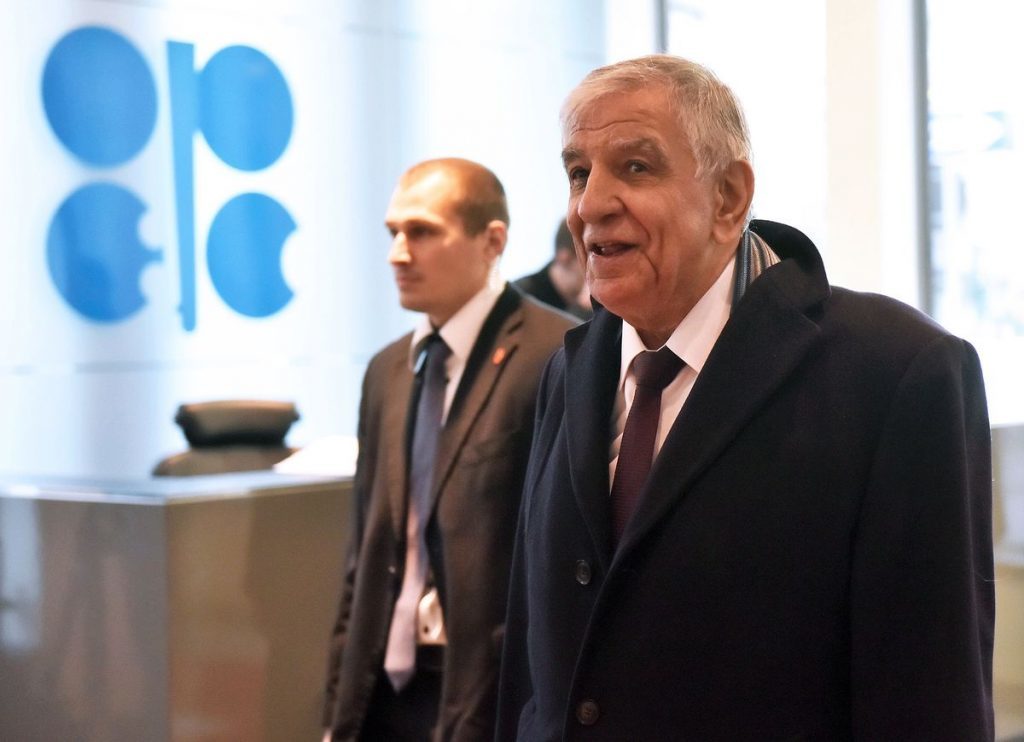
After weeks of often tense negotiations, OPEC ministers gathering in Vienna expressed renewed optimism about salvaging a deal to cut oil production and prop up global prices.
Brent crude rallied as much as 6.1 percent to $49.20 a barrel as Iraqi Oil Minister Jabbar al-Luaibi said OPEC ministers were unanimous in favor of an output cut, following a breakfast meeting in the city on Wednesday. It would be a six-month accord monitored by a committee, he said, adding that he hopes the curbs will boost the oil price to more than $55 a barrel.
“I am very optimistic we’re going to come with very fruitful results,” al-Luaibi said. “There will be a cut, yes, definitely.”
The group needs to resolve differences between its three biggest producers — Saudi Arabia, Iran and Iraq — at loggerheads over how to share the burden of a plan to reduce supply for the first time since 2008. Under an Algerian proposal put forward on Tuesday, the 14 members of OPEC would cut production to 32.5 million barrels per day from their October level of 33.6 million, according to two delegates familiar with the talks.
OPEC will reach an agreement, said Iranian Oil Minister Bijan Namdar Zanganeh, although his country will find another arrangement instead of freezing output. That upbeat tone was echoed by Mohammed Barkindo, secretary-general of the Organization of Petroleum Exporting Countries, and United Arab Emirates Oil Minister Suhail Mohammed Al Mazrouei, who said he expects some good news later in the day.
Sentiment Optimistic
“The sentiment generally is optimistic and positive,” Saudi Arabia’s Oil Minister Khalid Al-Falih said on Wednesday. “Any production-restraint agreement has to be distributed in an equitable way. We are getting close but much is to agree on the final terms.”
Following two years of low prices, the OPEC meeting has become a magnet for global finance, with hedge fund managers, institutional investors and top oil traders mingling with officials and ministers at the upmarket Hyatt, Ritz Carlton and Kempinski hotels in Vienna. Beyond oil, the OPEC gathering is now at the center of global macro trades from the Canadian dollar to Nigerian bonds to U.S. shale equities.
“We’re optimistic,” Nigeria’s Minister of State for Petroleum Emmanuel Kachikwu said in a Bloomberg TV interview from Vienna. “There’s still a few gray areas we have to patch up, but I like to go in believing that we’re going to reach a deal.”
Still, top producer Saudi Arabia is ready to reject an accord unless all members bar Libya and Nigeria participate, people with knowledge of the kingdom’s position said on Tuesday. Iranian Oil Minister Zanganeh has asserted his country’s right to keep raising production as its oil industry recovers from international sanctions. Iraq, too, wants special treatment, arguing it needs to maximize oil revenue to pay for the fight against Islamic State.
Read more: The balance of power in OPEC shifts toward Iran and Iraq
Iran has suggested it freeze production at 3.975 million barrels a day, or about 200,000 barrels a day above current output, two OPEC delegates said Monday. Saudi Arabia countered with a proposal for Iran to cap output at 3.707 million. Algeria, acting as a go-between, offered an alternative that would see Iran freeze at 3.795 million, the delegates said.
“There will be a production cut, agreed by everyone, with quotas for countries,” Algerian Energy Minister Noureddine Boutarfa said on Wednesday. Algeria “put the proposal on the table and it was the one that was agreed,” he said.
As OPEC tries to resolve its own differences, the group is also asking other big producers including Russia to reduce output by as much as 600,000 barrels a day. The Kremlin so far has resisted requests that it join the cut, offering instead to freeze production at current levels.
Energy Minister Alexander Novak said Tuesday that he has no plans to visit Vienna on Wednesday, but that Russia is ready to talk if the group reaches an internal consensus.
Recommended for you
